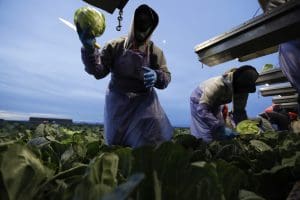New bill would give immigrant farmworkers relief for the first time in decades
‘Farmworkers can’t wait any longer.’

A key piece of legislation introduced in the House on Wednesday could provide relief for immigrant farmworkers for the first time in 35 years.
The Farm Workforce Modernization Act, introduced previously by Rep. Zoe Lofgren (D-CA) in 2019 and reintroduced on Wednesday afternoon, is the result of intense negotiation between Democrats, Republicans, as well as major agricultural employers and labor groups.
The bill would grant undocumented temporary immigrant farmworkers and their immediate family members legal status under a Certified Agricultural Worker visa, while long-term agricultural workers would be eligible for a green card.
“The men and women who work America’s farms feed the nation. But many of them do so while living and working in a state of uncertainty and fear, which has only been heightened by the COVID-19 pandemic,” Lofgren said in a statement. “Stabilizing the workforce will protect the future of our farms and our food supply.”
For the H-2A visa program, which currently provides only temporary authorization for seasonal workers, the bill would provide a more streamlined, simpler way for employers to apply, funding and oversight for laborers’ housing, and would ensure visas are good for three years, year round.
The reforms would be mutually beneficial, making more foreign workers available to work on farms — addressing labor shortages — and making the visas more accessible to workers.
Farmworker Justice, an immigrant laborer advocacy nonprofit, noted the United States has an estimated 2.4 million farmworkers, the large majority of whom are immigrants, and at least 49% of whom are undocumented.
“The bill … would improve significantly hundreds of thousands of farmworkers’ lives,” the nonprofit said in a 2019 statement, when the bill was first introduced, adding that it would also “eliminate [their] constant fear of deportation.”
Matt Adams, legal director at the Northwest Immigrant Rights Project, said in a phone interview that the current H-2A program “ties employees to employers in a way that exposes them to potential exploitation,” because there are currently not enough safeguards to protect workers at risk of losing their jobs if they speak out about workplace concerns.
“The industry says it wants a legal and stable workforce,” Giev Kashkooli, political and legislative director at United Farm Workers, said in an email. “Enacting genuine agriculture immigration reform — that lets undocumented farmworkers earn legal status by continuing to work in agriculture after passing criminal background checks — will provide what the growers say they want and need.”
While the Farm Workforce Modernization Act ultimately passed the House with bipartisan support in 2019, it was never brought to a vote in the Senate, where then-Majority Leader Mitch McConnell had pledged to kill all progressive legislation. But with Democrats now controlling both the White House and Congress, its prospects have changed.
“With Democrats leading the Senate and the White House, we now have good prospects to establish a path to citizenship for farmworkers … That gives us hope,” Kashkooli said, calling the bill “a big step in the right direction.”
Bruce Goldstein, president of Farmworkers Justice, also called the legislation “a big deal,” adding in a phone interview that he is “optimistic” about the bill being passed this time around.
Speaking to the Desert Sun in January 2020, Congressional Hispanic Caucus Chair Rep. Raul Ruiz (D-CA), along with bill co-sponsor Rep. Doug LaMalfa (R-CA), called the legislation a “win-win” for farmers and farmworkers alike.
The bill’s reintroduction comes on the heels of Democratic lawmakers unveiling the U.S. Citizenship Act earlier in February. That sweeping legislation incorporates many of President Joe Biden’s reform proposals, and paves a path to citizenship for farmworkers, allowing them to apply first for a green card and then naturalization after three years.
“Never before has a U.S. president presented his own comprehensive immigration reform measure on Day One in office; it includes the best terms for farm workers ever proposed. Now we must turn that vision into reality,” said Kashkooli.
The comprehensive immigration bill, however, does not currently have bipartisan support and faces long odds of passing.
Adams said that lawmakers may prioritize the larger legislation first, but could also amend it to include parts of, or concessions from, the farm bill. Either way, he said, reform for immigrant farmworkers was long overdue.
“There’s not been any program that really provides relief specific to farmworkers since the 1986 immigration reform,” he said.
Published with permission of The American Independent Foundation.
Recommended

Biden calls for expanded child tax credit, taxes on wealthy in $7.2 trillion budget plan
President Joe Biden released his budget request for the upcoming fiscal year Monday, calling on Congress to stick to the spending agreement brokered last year and to revamp tax laws so that the “wealthy pay their fair share.”
By Jennifer Shutt, States Newsroom - March 11, 2024
December jobs report: Wages up, hiring steady as job market ends year strong
Friday’s jobs data showed a strong, resilient U.S. labor market with wages outpacing inflation — welcome news for Americans hoping to have more purchasing power in 2024.
By Casey Quinlan - January 05, 2024
Biden’s infrastructure law is boosting Nevada’s economy. Sam Brown opposed it.
The Nevada Republican U.S. Senate hopeful also spoke out against a rail project projected to create thousands of union jobs
By Jesse Valentine - November 15, 2023









































































